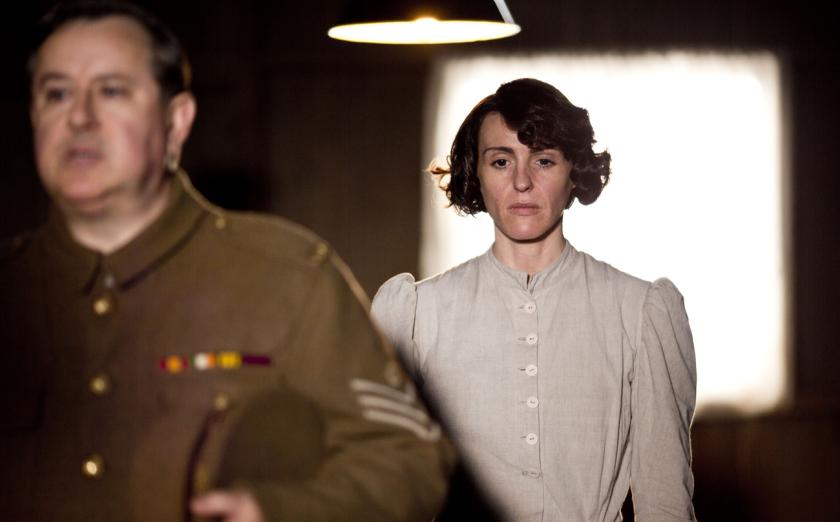After a tentative start, and several episodes of insipidity, Sarah Phelps's World War One nursing drama started to hit its straps just as series one reached its conclusion. The pace accelerated, the characters flung off their camouflage of tepid blandness, and suddenly everyone was struggling with crises, guilt and dark secrets.
At heart The Crimson Field is a soap in uniform, with its manufactured climaxes and blithe leaps from implausible event to absurd coincidence, but it's powered along by a formidable cast whose acting has grown stronger by the TV hour. The final episodes were dominated by Sister Joan's potentially fatal passion for her German lover Anton, whom she'd met in Liverpool before the war but who had returned to Germany to visit his sick father and ended up in uniform (a German one, that is). Joan's quest to find out what had happened to him earned her a court martial for assisting the enemy, for which the penalty is death. She declined rapidly from caring medical professional to a ghostly extra from Prisoner Cell Block H.
 But this strayed a little too far into overheated, purple-hued melodrama, and the most interesting stuff was going on elsewhere, notably in the torrid private life of Kitty Trevelyan (Oona Chaplin, pictured right). Kitty's curse is that she's a bit of a bloke-magnet, with chaps virtually falling out of trees to get an illicit date with her. Chief among these are the young surgeons Captain Gillan (Richard Rankin) and Captain Hesketh-Thorne (Alex Wyndham, pictured below), and it looks like both of them may be in with a chance (EastEnders veteran Phelps fully understands the art of the loose end). What kicked the Kitty storyline out of neutral and into quasi-tragic overdrive was a bitter encounter with her cuckolded and vengeful husband, played with odious relish by Samuel West. Suddenly Kitty's acid aloofness fell into logical perspective.
But this strayed a little too far into overheated, purple-hued melodrama, and the most interesting stuff was going on elsewhere, notably in the torrid private life of Kitty Trevelyan (Oona Chaplin, pictured right). Kitty's curse is that she's a bit of a bloke-magnet, with chaps virtually falling out of trees to get an illicit date with her. Chief among these are the young surgeons Captain Gillan (Richard Rankin) and Captain Hesketh-Thorne (Alex Wyndham, pictured below), and it looks like both of them may be in with a chance (EastEnders veteran Phelps fully understands the art of the loose end). What kicked the Kitty storyline out of neutral and into quasi-tragic overdrive was a bitter encounter with her cuckolded and vengeful husband, played with odious relish by Samuel West. Suddenly Kitty's acid aloofness fell into logical perspective.
Along the way we learned a little more about the prim, repressed Rosalie Berwick (Marianne Oldham), who may be terrified of the naked male body but can number gardening and playing the piano among her accomplishments. Meanwhile Quartermaster Soper (Jeremy Swift) has formed a diabolical duo with Kerry Fox's conniving Sister Quayle.
 Now the drama has finally worked up enough horsepower to keep you riveted, you're less likely to notice the generally ahistorical feel of the piece. Military discipline and regulations are either applied with fanatical rigour or disappear entirely, as the characters swan about doing whatever they like. The notion of viewing the British Army in 1915 through the concerned eyes of a progressive sisterhood is a wonderful dramatic device, but one which would have been incomprehensible to the protagonists 100 years ago.
Now the drama has finally worked up enough horsepower to keep you riveted, you're less likely to notice the generally ahistorical feel of the piece. Military discipline and regulations are either applied with fanatical rigour or disappear entirely, as the characters swan about doing whatever they like. The notion of viewing the British Army in 1915 through the concerned eyes of a progressive sisterhood is a wonderful dramatic device, but one which would have been incomprehensible to the protagonists 100 years ago.
It's also seriously light on anything resembling warfare. The casualties at the field hospital are marvellously decorous, and are never carried in with their intestines hanging out or half their heads blown off. And you can't help feeling that cold-blooded Colonel Purbright, bellowing at sensitive Colonel Brett (Kevin Doyle) to toughen up and stop trying to be everybody's father, is the most realistic character on display. Still, get a move on with series two, willya?















Add comment